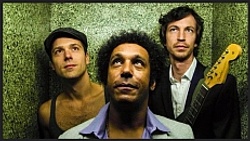
Drahla
Du willst wissen wie das klingt?
Das sagt der/die Künstler:in:
This year, Drahla make their long-awaited return with their astounding second record angeltape. It’s an offering that was not only interesting for the Leeds-based art-rock experimentalists to make, but offers an intriguing world for audiences to explore with a similar curiosity that informed the songwriting process. This inclination to eschew conventional melodic structures and embrace uncertainty across their latest material gives fans an unfiltered insight into a challenging transitional period the band found themselves in following the release of their 2019 critically acclaimed debut, Useless Coordinates. That blistering introduction, described as a “darkly affecting uncompromising listen”, along with the success of their Third Article EP from 2017, saw them share stages with Parquet Courts, Ought, Buzzcocks and several more. Angeltape, recorded with Matthew Benn and Jamie Lockhart in 2023, is an altogether more introspective and abstract examination of the self. “The core is off kilter I’m sure / When you feel too detached for your own words,” Brown intones on ‘Lip Sync’, an early glimpse into Drahla’s extraordinary artistic evolution.
Angeltape is an avant garde document of the events that unfolded over the five-year gap between records which saw a variety of changes – good and bad – steer their professional and personal lives down unfamiliar territories. Instead of succumbing to adversity, however, Drahla re-emerge sounding creatively rejuvenated and examine this time with deeply reflective perspectives. Over the last few years, they suffered devastating losses and expanded their sound with guitarist Ewan Barr joining vocalist and guitarist Luciel Brown, bassist Rob Riggs and drummer Mike Ainsley. These recent experiences – collective and individual – culminate in a sound that is considerably darker and tonally more complex and conceptual in its essence. Delving into themes of grief and trauma whilst simultaneously celebrating moments of sentimentality and support during difficult times, angeltape shifts between being a challenging, comforting and ultimately rewarding record for both artist and audience.
The addition of Ewan Barr to Drahla’s visceral and vital arrangements signaled a significant shift in the band's dynamic, ultimately reshaping the way they approach their angular arrangements. Crucially, it allowed Drahla to dismantle previous limitations and carve out new sonic avenues to experiment with form more than ever before. Brown, in particular, embraced this opportunity to find different ways to inhabit her contemplative lyrics. There was, of course, a readjustment period for the band as they came together to write angeltape in this new iteration which kickstarted a renewed creative approach. “There was an uncertainty and anxiety in not knowing how to rekindle what we had and what we did have just didn’t exist in the same format,” Brown explains. “I feel this is apparent in the music; the constant changes, opposing ideas and structures, the overall energy and drive of the songs. I think there's also the sense of reconnection, encouragement and freedom, too. There's excitement borne from us finding something together again.”
Sonically, the exhilarating interplay of driving bass riffs and charged drum patterns provide a captivating contrast to Brown’s melodic spoken delivery. The enveloping atmosphere emanating from the quartet is heightened by searing saxophone accompaniments by long-standing collaborator Chris Duffin, who has featured on all of Drahla’s previous output. There’s an irresistible and unwavering potency surging throughout this masterful second record, one that stays with you long after you first step into Drahla’s enticing world. Furthermore, this exciting new chapter is anchored by the quartet finding a great source of inspiration in the joy of playing music together, as bassist Rob Riggs adds: “When the four of us are in a room, we each bring separate things to the table. Sometimes, a session would start a little bit disjointed but then we find a way where we could all interlock together for a moment in a song and then disperse again.”
Drawing some inspiration from experimental rock band This Heat, Drahla primarily found that their greatest motivation came from listening to and following one another throughout the recording sessions. “I think the process and inspiration for this album has been way more experimental and insular than taking on any external musical references,” says Brown, “This record feels like it was built on a foundation of insular inspiration.” This autonomous practice extends beyond Drahla’s music into the visual representation of their intense and immersive instrumentation. It’s almost impossible to listen to songs as intricately layered – musically and lyrically– as theirs and not imagine the spaces they exist within. Thus providing an awe-striking multi-sensory experience every time you spend time with a Drahla record.
Du willst wissen wie das klingt?
 Band
Band
Beyond Confidence
 Band
Band
HE/RO
 Band
Band
Steintor Herrenchor
 Band
Band
Bachratten
 Band
Band
Christin Nichols
 Band
Band
Soft Loft
 Band
Band
Radio Bickendorf
 Band
Band
the bottomline
 Band
Band
White Coffee
 Band
Band
ELDORADO
 Band
Band
Ask Gonzalo
 Band
Band
Scholastika Jazz Orches…
 Band
Band
Ragoody Orchestra
 Band
Band
Das Lumpenpack
 Band
Band
EingangQuintet
 Band
Band
Three and a Half
 Band
Band
Heavysaurus
 Band
Band
The Hirsch Effekt
 Band
Band
Blendend
 Band
Band
Blendend

